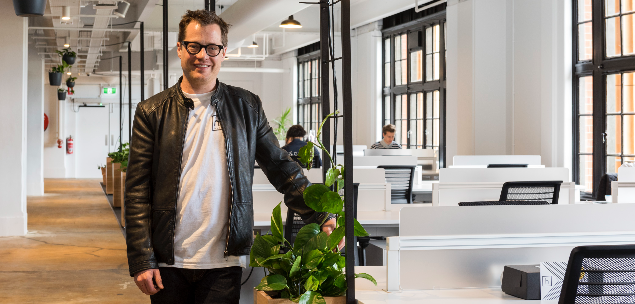Co-working spaces combine the start-up experience with the perks of larger companies to help growing businesses engage talent – and they’re increasingly self-sufficient ecosystems that thrive on B2B trade. So says Brad Krauskopf, founder and CEO of Hub Australia.
Launched in 2011, the company expanded its network of co-working spaces, last month, when it opened Victoria’s largest co-working space, Hub Southern Cross. The new venue, which provides space for up to 700 tenants, occupies two floors of the historic Mail Exchange building on the corner of Spencer and Bourke streets, near Southern Cross Station. It has a variety of areas for 1 to 20 person teams, including private offices, and customisable spaces for larger company members. Additional on-site features include 20 unique meeting rooms, a café, a gym, bike parking, relaxation space, media room, plants and event space for up to 100 people.
Krauskopf spoke to Dynamic Business about the opportunities for businesses s arising from the co-working movement:
Growth, innovation: “Co-working spaces were initially used just by freelancers but have become a legitimate means for small businesses to grow. Businesses are joining us when they’re just one or two people and they remain with us as they expand. Increasingly, corporates are also taking advantage of co-working spaces. They’re sending staff off-site to connect with small businesses and innovate. The best example right now is Australia Post, which has its innovation team at the Hub.”
Staff incentives: “Businesses are choosing and remaining at co-working spaces because it enhances their ability to attract and retain talent. Many people love working for small businesses but also want some of the perks of working for a larger company, i.e. the social and business connections plus the the art facilities – co-working spaces such as the Hub equip small businesses with these staff incentives. Additionally, creating work/life balance is one of Hub’s five brand promises, which is why we offer social and wellness programs every week as well as a gym and relaxation space at Hub Southern Cross.”
Flexibility, mobility: “Co-working spaces affords businesses a great deal of flexibility, which they wouldn’t get if they were just leasing office space. Co-working spaces mean you only use as much space as you need and they allows you to flex as your business grows, subtract if need be, and grow again. We have a great variety of space, depending on what stage you’re at in your business growth. Our members can work from each of the Hub locations – we operate in Melbourne, Sydney, Adelaide and we’re going to open in Brisbane. They can also take advantage of co-working spaces in the global network of our partner, LExC.”
Diverse ecosystem: “Whereas some co-working spaces focus, for instance, on fintech or start-ups or the arts, we curate our membership to ensure it remains diverse because diversity of businesses and people is great for innovation – and it keeps things interesting! This has led to a huge amount of B2B trade. In fact, we’ve had members where 100% of their businesses comes from within the Hub. Diversity has also led exciting partnerships and initiatives. For instance, TEDxAdelaide emerged from a union of different members at Hub Adelaide. More recently, a member in Melbourne who runs a law firm invited an investor to the Hub for a meeting and, during the visit, introduced him to a marketing company. By the time the investor left, he’d signed up the marketing company as a supplier.”

